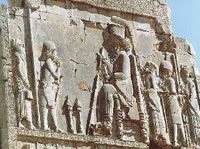The Xerxes Canal

In 480 B.C., King Xerxes,(khashayar), of Persia ordered his men to build a canal a mile and a quarter long through a peninsula in Northern Greece- conceivably one of the biggest engineering assignments of it's time. The canal was critical to Xerxes' plan of invading Greece, a goal that his general, Mardonius, had unsuccessfully attempted 12 years earlier. Mardonius's fleet was destroyed in a storm while sailing around the tip of the peninsula, and Xerxes wanted to avoid a similar setback by building the canal. Xerxes went on to invade Greece, starting a brief period of Persian conquest in Europe. In the 2,500 year since, historians have debated whether the famed ca
 nal of Xerxes was really dug all the way from Coast to Coast. Some have doubted its existence, pointing to a rocky plateau that they argue would have made the construction an impossible task for workers of those days. Now, scientists from Britain and Greece have come up with what they say is conclusive evidence that the canal was indeed built. The structure now lies buried and a map has been drawn detailing the canal's dimensions ans courses. The findings confirms the description given in an account by the ancient Greek histiruan Herodotus, which some scholars have long regarded with skepticism. Buried under centuries of silt and alluvium, the structure is testament to remarkable military strategy, work-force management and civil engineering. It also tells of an eager king who was in such a hurry to conquer the World that he never thought of preserving the canal as a perminent waterway.Spanning about 100 feet at the surface, the canal was just wide enough for two war galleys to pass. Its sides sloped inward, forming a width of roughly 50 feet at the bottom, about 45 feet below the surface. The construction was as much of a feat of management as it was of engineering. Upon the completion of the canal, the Persian fleet made it safely to the Agean Sea, where it was joined by troops that had taken the land route from the North. The ships sailed on to Greece. Xerxes's soldiers stormed the Coast and advanced deep into Greek territory. They destroyed Athenes but eventually lost to Athenians in a battle that ended the Persian's fleeting imperial presence in Europe.
nal of Xerxes was really dug all the way from Coast to Coast. Some have doubted its existence, pointing to a rocky plateau that they argue would have made the construction an impossible task for workers of those days. Now, scientists from Britain and Greece have come up with what they say is conclusive evidence that the canal was indeed built. The structure now lies buried and a map has been drawn detailing the canal's dimensions ans courses. The findings confirms the description given in an account by the ancient Greek histiruan Herodotus, which some scholars have long regarded with skepticism. Buried under centuries of silt and alluvium, the structure is testament to remarkable military strategy, work-force management and civil engineering. It also tells of an eager king who was in such a hurry to conquer the World that he never thought of preserving the canal as a perminent waterway.Spanning about 100 feet at the surface, the canal was just wide enough for two war galleys to pass. Its sides sloped inward, forming a width of roughly 50 feet at the bottom, about 45 feet below the surface. The construction was as much of a feat of management as it was of engineering. Upon the completion of the canal, the Persian fleet made it safely to the Agean Sea, where it was joined by troops that had taken the land route from the North. The ships sailed on to Greece. Xerxes's soldiers stormed the Coast and advanced deep into Greek territory. They destroyed Athenes but eventually lost to Athenians in a battle that ended the Persian's fleeting imperial presence in Europe.
4 Comments:
I'd like to go there in order to admiring that natural beauty, actually that place is perfect because people's culture is exotic.
Pyramids are the most incredible thing that the ancients leave us, today many people believe that they were built by us humans, but there is no evidence of that being true, I think there is more evidence of the pyramids been built by other more intelligent race that lived here before our history began.
wow as always learn something new in general the story is fantastic recommend reading these articles
xanax online prescription long does xanax show up drug test - cost generic xanax without insurance
Post a Comment
<< Home